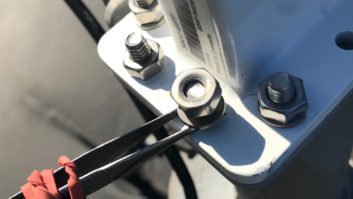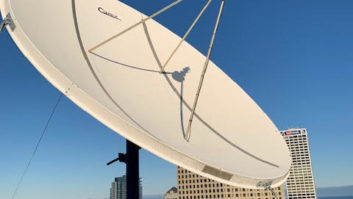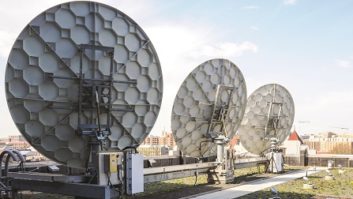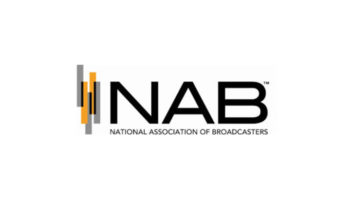This article has been amended concerning costs that might affect radio stations.
FCC Chairman Ajit Pai on Thursday laid out his proposal to auction 280 MHz of C-Band spectrum to use for 5G services. The plan includes reimbursement of incumbent fixed satellite companies for expenses caused by the resulting repack.
The NAB called it “an important step towards ensuring a stable C-Band ecosystem following reallocation,” though without seeming to endorse it outright; the association said it would review the plan.
The C-Band is a 500-megahertz segment of spectrum being used currently by the satellite companies to distribute audio and video content to broadcasters and cable systems. Those services are expected to be repacked to the upper 200 megahertz of the band (4.0–4.2 GHz). Pai detailed the new draft rules during a speech to the Information Technology & Innovation Foundation in Washington.
Pai’s plan would make the lower 280 megahertz of the C-Band (3.7–3.98 GHz) available for flexible use, including 5G, through a public auction, which the chairman wants to begin in December 2020.
This strikes an appropriate balance between making available critical mid-band spectrum for 5G and protecting incumbent uses, according to Pai.
Relocation costs of the C-Band’s current users will be covered, according to the chairman’s proposal. The FCC acknowledges new satellites will need to be launched and filters replaced on earth stations as part of the repack. Under an accelerated relocation incentive package, Pai’s plan would allow fixed satellite operators and other incumbents to tap a pool of $9.7 billion if they meet the accelerated clearing milestones.
Satellite operators would receive the higher payments if they clear the lower 100 megahertz of the C-band in 46 of the top 50 Partial Economic Areas by September 2021, and the remaining 180 megahertz of the C-Band by September 2023, Pai said today.
The reimbursement money for C-Band incumbents disrupted by the repack would come from the winning bidders in the C-Band auction, according to the FCC. Pai did not disclose how much the FCC hopes to generate from the spectrum auction to 5G service providers. The FCC hopes to begin the auction on Dec. 8, 2020.
The fixed satellite operators had argued for more money, Pai said. “In sum, as I see it, the Goldilocks principle applies here. Some may say $9.7 billion is too high. Some may say it’s too low. I say it’s just right — if you are genuinely focused on ensuring that the prompt development of the C-Band is needed for American leadership in 5G.”
Pai says he shared the plan this morning with fellow commissioners. The proposal is expected to be voted on as a Report and Order at the FCC’s next Open Meeting in late February. The Notice of Proposed Rulemaking would allow for a public comment period.
Complete details of the chairman’s C-Band proposal will be available on the FCC’s website Friday.
The National Association of Broadcasters reacted: “Today marks an important step towards ensuring a stable C-Band ecosystem following reallocation — one that makes significant spectrum available for mobile use while protecting content distribution relied upon by hundreds of millions of Americans today,” said NAB Executive Vice President of Communications Dennis Wharton. “In this and other spectrum proceedings, NAB has played a leading role developing constructive solutions that provide meaningful benefits to all stakeholders.” He said NAB would review the plan and work with the FCC “towards a solution that benefits both current and new users of the spectrum band.”
The National Association of Tower Erectors said the draft rules would reform the use of the C-Band and make a large amount of spectrum available for 5G … The plan appears to strike the right balance to free up access to critical midband spectrum while protecting incumbent users.”
Commissioner Michael O’Rielly, who has been active on this issue, said, “Much time and attention has been spent on the appropriate incentive payment for the satellite providers, and I am pleased that an agreement was reached that should allow them to fully and voluntarily participate in this transition.”
There are expected to be provisions within the FCC C-Band Report & Order that spell out reimbursements to incumbent radio stations with C-Band earth stations that will be impacted by the relocation of spectrum.
“There has been extensive discussion of the work and costs that could be incurred by incumbent earth stations, those who were properly registered with the commission. And the possible costs they’ll be reimbursed for, such as new filters, potentially labor costs to repoint antennas or installing of new antennas,” according to a senior FCC official.
More details on eligibility requirements and how stations will submit expenses for reimbursement are expected to be forthcoming from the FCC.
The FCC has issued a summary of the plan. Here is the section regarding costs:
“Relocation costs of the C-Band’s current users would be covered. It will cost money for all their operations to be moved to the upper 200 MHz of the C-Band. Among other things, new satellites will need to be launched, and filters will need to be placed on earth stations. Satellite operators and other incumbents would be reimbursed by the winning bidders in the C-Band auction for reasonable relocation costs,” the FCC wrote in the summary.
“Additionally, satellite operators would have the opportunity to receive accelerated relocation payments if they are able to clear the lower portion of the C-Band on an accelerated timeline, thus advancing the national priority of making spectrum available for 5G deployment more quickly. These payments would create powerful incentives for incumbent operators to expedite the transition, and operators would only be paid if in fact they did so. The accelerated payments could total up to $9.7 billion and would be paid by winning bidders in the C-Band auction.”












